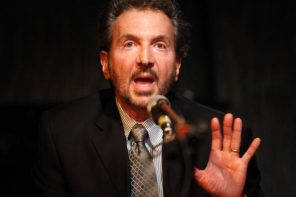At last night’s Academy Awards America met the God to whom many progressives pray—the God who is justice and love.
Anyone who believes that all of God’s children are created in God’s image is likely celebrating the acceptance speeches of both Sean Penn, who won Best Actor for his portrayal of gay activist Harvey Milk, and Dustin Lance Black, who won Best Screenplay for the Milk script.
Black:
Penn:
Though Penn’s taunt of shame on the anti-gay protesters who greeted ceremony-goers will likely be the more talked-about of the two, Black’s speech was the more extraordinary.
In his succinct and elegant remarks, the young screenwriter acknowledged his own Mormon upbringing, and talked of his dream of one day getting married (presumably to a man, since Dustin Lance Black is gay). This night in California, where citizens recently nullified their state Supreme Court decision legalizing same-sex marriage, he wore the white ribbon that symbolizes the cause of same-sex marriage rights. He spoke of his gratitude for his mother’s acceptance of him as he is. And then he made a plea to any young lost souls who may be struggling to accept themselves.
“If Harvey had been alive today,” Black said, “I think he’d want me to say to all the gay and lesbian kids out there that have been told that they are less-than by their churches, their government or their families that they are beautiful, wonderful creatures of value and no matter what anyone tells you, God does love you…”
Black went on to say that he expects gay people (and I assume he meant the whole lesbian, gay, bisexual and transgender community) to win full equal rights in the near future. Leaders in the LGBT community will rightly laud Black for his courage in taking the gay rights cause to the airwaves during his 45 seconds on Oscar night. But what struck me was his religious language—and his implicit claim of self-agency in interpreting the voice of God as he hears it.
This is exactly what leaders of the religious right—and all leaders of authoritarian religions—fear more than any other trait of religious liberals: the belief in one’s own conscience as the voice of a living God. The campaigns of religious leaders against specific groups of people—be they a given gender, race, ethnicity or sexual orientation—are in the end about the right to self-determination by members of the targeted group. While the claims made by authoritarian religious leaders against their targets may be framed around certain traits or behaviors they claim that God abhors, such as gay sex and abortion, elimination of those traits is not the primary purpose of their warfare. It’s about authority.
If feminists and queer folk who justify their claims in the secular language of rights are dangerous, the religious liberal who finds his or her own acceptance in the voice of God is even more so. What if that gospel were to spread? What work would there be for those disdainful priests and televangelists were we to believe that God lives in our own hearts and souls, and did not create us to live lives of shame and deprivation for being as God made us? Without shame and guilt as weapons to wield on the people of God, how will the people be controlled?
In his remarks upon winning the award for Best Original Soundtrack for his work on Slumdog Millionaire (winner of the Best Picture award), Indian composer A.R. Rahman said in Tamil, “All glory and fame is to God.” A convert to Islam in a country known for deep sectarian violence between Muslims and Hindus, Rahman added, “I always had a choice between love and hate in my life. I chose love and I am here.”
Didn’t someone once say that God is Love?



